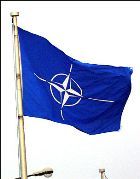NATO ruled out sending troops to Sudan’s Darfur
By GARETH HARDING
Mar 30, 2006 (BRUSSELS) — NATO has categorically ruled out sending troops to Darfur despite pleas from U.S. President George W. Bush and several high-ranking senators for a more robust alliance role to prevent further bloodletting in the war-torn Sudanese province.
 Last month, Bush phoned NATO Secretary General Jaap de Hoop Scheffer to press the case for the 26-member military bloc to “take the lead” in stopping the slaughter in Darfur. At a White House meeting last week, the U.S. president repeated his demand for the alliance to adopt a more muscular stance on Sudan. Bush said that if the African Union, which currently heads the peacekeeping effort in Darfur, hands over its mission to the United Nations later this year, “NATO can move in with United States’ help … to make it clear to the Sudanese Government that we’re intent upon providing security for the people there.”
Last month, Bush phoned NATO Secretary General Jaap de Hoop Scheffer to press the case for the 26-member military bloc to “take the lead” in stopping the slaughter in Darfur. At a White House meeting last week, the U.S. president repeated his demand for the alliance to adopt a more muscular stance on Sudan. Bush said that if the African Union, which currently heads the peacekeeping effort in Darfur, hands over its mission to the United Nations later this year, “NATO can move in with United States’ help … to make it clear to the Sudanese Government that we’re intent upon providing security for the people there.”
Prominent U.S senators have also called on the Brussels-based military club to become more involved in Darfur. Democrat Joseph Biden of Delaware and Kansas Republican Sam Brownback last month tabled a resolution calling for NATO troops to be sent to the region and for the alliance to enforce a no-flight zone over Darfur.
However, there seems to be little appetite for a greatly enhanced NATO role within the alliance. “No one is discussing, planning or considering a NATO force on the ground in Darfur. That is not one of the options,” spokesman James Appathurai told reporters Wednesday after a meeting of NATO ambassadors.
Speaking on condition of anonymity, a NATO official told United Press International that the idea of the alliance dispatching ground troops to the troubled province was a “non-starter with the Africans, a non-starter with the United Nations and a non-starter with NATO.” Officials in Brussels also criticized the U.S. president for sending out confused messages about what he expects from the alliance. “Bush has been a little bit unclear in his language,” said one, referring to the president’s call for 20,000 peacekeepers to be sent to Darfur under NATO’s command.
There are currently 7,000 poorly-equipped African Union troops in Darfur, an arid and impoverished region of Sudan that has been racked by conflict for almost three years. About 200,000 black Africans — mainly Christians or animists — are believed to have been killed by pro-government, Nilotic Muslim militias during the bloody war. A further two million have fled their homes and are now living in makeshift camps. The United States has described the slaughter in west Sudan as “genocide,” although the United Nations and European Union have both stopped short of using the term.
NATO last year agreed to airlift African Union troops to Darfur, which is roughly the size of France, and help train its soldiers. “I’m quite sure, as I told the president, that when the U.N. comes, the NATO allies will be ready to do more in enabling a United Nations force in Darfur,” De Hoop Scheffer told reporters after his meeting with Bush.
U.N. Secretary General Kofi Annan Monday phoned De Hoop Scheffer to ask the NATO chief to develop a range of possible options for supporting the African Union mission and its possible takeover by the United Nations. But officials said there was unlikely to be a step-change in the alliance’s military commitment. “There will be a beefed up NATO role, but there will be no NATO lead in Darfur. People here are talking about more of the same, maybe with more planners and logistical help,” said one. Appathurai said the 57-year old bloc would look at Annan’s request “in the context of what NATO is already providing.”
NATO’s reluctance to get dragged further into the Darfur conflict, which is already spilling over the borders into Chad, is partly explained by the fact that its member nations’ troops are already bogged down in Iraq, the Balkans and Afghanistan. But there is also strong opposition to international peacekeepers arriving in Darfur within Sudan. Earlier this month, thousands of protestors marched through the capital Khartoum to voice their resistance to United Nations soldiers taking over peacekeeping duties in Darfur. “U.N. troops bring your coffins with you,” said one banner at the demonstration. One NATO diplomat told the International Herald Tribune that neither the Sudanese government nor the African Union “want to see white, European troops coming into Sudan,” adding that the idea of a no-flight zone over Darfur would be impossible to implement. “Which NATO country would be willing to shoot down a Sudanese plane?”
With the African Union running out of money to pay for its $24 million a month Darfur mission, EU ambassadors Tuesday agreed $60 million in emergency aid to keep the peacekeeping force afloat. The European Commission has already given $195 million to the pan-African body to bankroll its military operation in Sudan.
(UPI)
